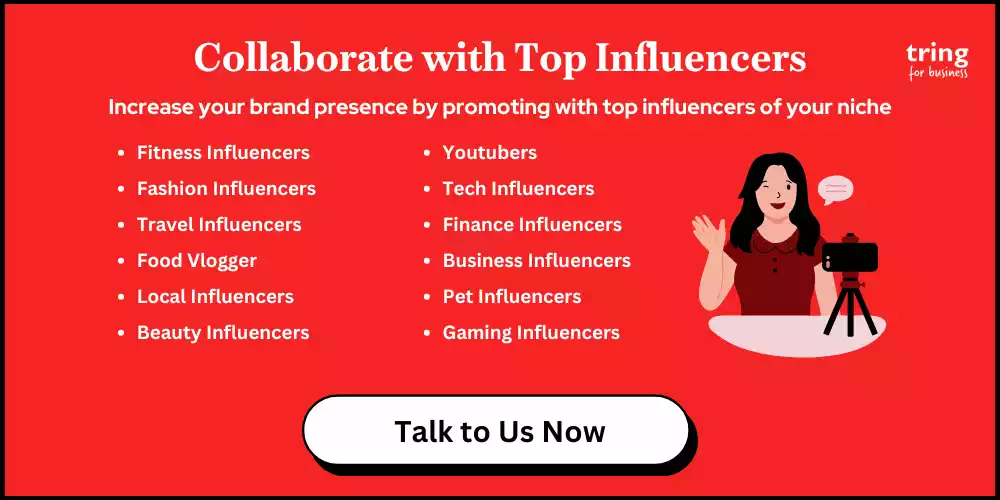Why Brands Must Do Influencer Marketing?
Simply put, influencer marketing is the need of the time, your brand needs to be present in customers' minds and when a popular influencer in your industry recommends your product, it will help your brand significantly. Along with that, there are reasons like:
-
More Social Media Presence: Collaborating with influencers helps brands stay visible across social media platforms, reaching audiences who actively follow and trust these influencers.
-
Increased Brand Awareness: Influencers introduce your brand to their dedicated followers, creating an opportunity for more people to recognize and remember your brand.
-
Targeted Reach: Influencers cater to niche audiences, allowing brands to connect with specific demographics that align with their target market.
-
Improved Brand Authority: Partnering with credible influencers enhances a brand's reputation, making it appear trustworthy and reliable in the eyes of consumers.
-
Opportunity for Lead Generation: Influencer marketing campaigns often drive traffic to landing pages or websites, generating valuable leads for brands.
-
Boost in Sales: Influencers inspire purchase decisions through authentic endorsements, resulting in increased conversions and higher sales.
Know the benefits of influencer marketing in more detail with examples.
![Collaborate with Top Influencers (1).png Collaborate with Top Influencers]()
Which Types Brands Must Bo Influencer Marketing?
Influencer marketing is essential for various types of brands. Consumer-facing industries like fashion, beauty, fitness, food, and tech thrive on influencer collaborations to showcase products, drive engagement, and boost sales. Travel and hospitality brands leverage influencers for immersive storytelling, while startups use them to build visibility and trust quickly.
Even B2B brands can benefit from influencer marketing by partnering with industry experts or thought leaders to enhance credibility, reach niche professional audiences, and generate quality leads. Regardless of the industry, influencer marketing offers tailored strategies to connect with the right audience and achieve marketing goals.
What are the Different Types of Influencers Brands Work With?
Brands work with different types of influencers based on their goals and target audience. Mega influencers, such as celebrities, have massive followings (1M+), offering broad reach. Macro influencers (100K–1M followers) are well-known creators who balance reach and engagement. Micro influencers (10K–100K followers) and nano influencers (1K–10K followers) specialize in niche audiences, delivering high engagement and authenticity. Industry experts bring authority and credibility in specific fields, while content creators focus on producing high-quality, engaging material like videos, blogs, and photography to promote brands effectively. Each type serves unique marketing objectives.
What Statistics Tell About Influencer Marketing?
Statistics reveal the growing importance and effectiveness of influencer marketing. The industry's market size is projected to grow from $9.7 billion in 2020 to $21.1 billion in 2024, reflecting its rapid adoption. Additionally, 75.5% of brands either maintained or increased their budgets in 2023, with 18% investing seven figures or more, showcasing confidence in their ROI. Moreover, 86% of brands found influencer-generated content to match or outperform brand-created content, proving its ability to drive authentic engagement and deliver results. Along with that, there many other influencer marketing statistics show it's a need of the time for every brand.
Which is the Best Platforms for Influencer Marketing?
The best platforms for influencer marketing depend on the target audience and content type. Instagram leads with its focus on visual content, stories, and reels, making it ideal for lifestyle and fashion brands. YouTube excels in long-form content, such as product reviews and tutorials. LinkedIn stands out for B2B collaborations, connecting brands with industry professionals. Facebook remains versatile for reaching diverse audience groups, and Twitter is effective for engaging in real-time conversations and trending topics. Each platform offers unique advantages for tailored influencer marketing strategies.
Is Influencer Marketing better than Celebrity Endorsement?
It depends on the brand's goals and audience. Influencer marketing offers authenticity and niche targeting, making it highly effective for engaging specific demographics with relatable content. It is often more cost-effective and generates higher engagement due to the personal connection influencers have with their followers. On the other hand, celebrity endorsement provides massive reach and instant credibility, making it ideal for building widespread brand awareness quickly. While influencer marketing suits digital campaigns and smaller budgets, celebrity endorsements are better for traditional media and larger-scale campaigns. Both strategies can complement each other when used strategically.
What Influencer Marketing Challenges Brands Face?
-
Finding the Right Influencers: Identifying influencers who align with brand values and target audiences can be time-consuming and challenging.
-
Measuring ROI: Tracking the effectiveness of campaigns and quantifying ROI remains a common difficulty for many brands.
-
Fake Followers and Engagement: Some influencers may inflate their follower counts or engagement metrics, leading to ineffective collaborations.
-
Maintaining Authenticity: Overly promotional content can appear inauthentic, reducing the impact of the influencer marketing campaign.
-
Budget Constraints: Balancing costs while ensuring meaningful collaborations can be tricky, especially for smaller brands.
-
Compliance and Transparency: Adhering to advertising regulations and ensuring proper disclosure is essential but often overlooked.
These challenges highlight the need for careful planning and strategy in influencer marketing campaigns.
![birthday occasion]() Birthday Gifts
Birthday Gifts
![anniversary occasion]() Anniversary Gifts
Anniversary Gifts
![women]() Women
Women
![men]() Men
Men
![Couples]() Couples
Couples
![Couples]() Wedding Gifts
Wedding Gifts

 Birthday Gifts
Birthday Gifts
 Women
Women
 Men
Men
 Anniversary Gifts
Anniversary Gifts
 Wedding Gifts
Wedding Gifts

 We now support international payments
We now support international payments
